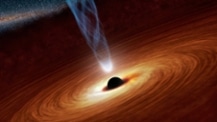Jun 14 2017
An interdisciplinary team of physicists and astronomers at the University of Amsterdam’s GRAPPA Center of Excellence for Gravitation and Astroparticle Physics has devised a new strategy to search for 'primordial' black holes produced in the early universe. Such black holes are possibly responsible for the gravitational wave events observed by the Laser Interferometer Gravitational-Wave Observatory.
 Artist's concept of a black hole accreting gas and producing a jet of high-energy particles. (Credit: NASA)
Artist's concept of a black hole accreting gas and producing a jet of high-energy particles. (Credit: NASA)
In a paper that appeared in Physical Review Letters this week, the researchers specifically show that the lack of bright X-ray and radio sources at the center of our galaxy strongly disfavours the possibility that these objects constitute all of the mysterious dark matter in the universe.
Primordial black holes
The existence of black holes tens of times more massive than our Sun was confirmed recently by the observation of gravitational waves, produced by the merger of pairs of massive black holes, with the LIGO interferometer. The origin of these objects is unclear, but one exciting possibility is that they originated in the very early universe, shortly after the Big Bang. It has been suggested that these 'primordial' black holes may constitute all of the universe’s dark matter – the mysterious substance that appears to permeate all astrophysical and cosmological structures, and that is fundamentally different from the matter made of atoms that we are familiar with.
An interdisciplinary team of UvA physicists and astronomers proposed to search for primordial black holes in our galaxy by studying the X-ray and radio emission that these objects would produce as they wander through the galaxy and accrete gas from the interstellar medium. The researchers have shown that the possibility that these objects constitute all of the dark matter in the galaxy is strongly disfavoured by the lack of bright sources observed at the galactic center.
Collective effort
‘Our results are based on a realistic modelling of the accretion of gas onto the black holes, and of the radiation they emit, which is compatible with current astronomical observations. These results are robust against astrophysical uncertainties’, says Riley Connors, PhD student at the UvA and an expert in black hole astrophysics. ‘What’s even more interesting”, adds Daniele Gaggero, first author of the publication, ‘is that with more sensitive future radio and X-ray telescopes, our proposed search strategy may allow us to discover a population of primordial black holes in our galaxy, even if their contribution to the dark matter is small.’
‘A convincing implementation of our original idea was possible thanks to the collective effort of an interdisciplinary team of scientists at the GRAPPA Center of Excellence for Astroparticle Physics’, says Gianfranco Bertone, GRAPPA spokesperson. ‘This includes theorists studying dark matter and the formation of black holes, astrophysicists modelling the subsequent accretion process, and astronomers working on radio and X-ray observations.’
The new findings are expected to shed light on the formation and origin of primordial black holes as well as of standard astrophysical black holes that are formed when stars collapse.
Source: http://www.uva.nl/